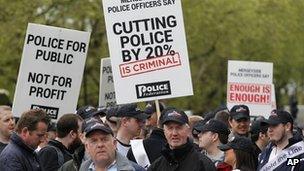Police Federation vote over 'right to strike' fails
- Published

Off-duty police officers marched through London in protest at cuts in 2012
The Police Federation of England and Wales has failed to achieve enough votes to lobby the government for industrial rights.
An online ballot by the federation, which has more than 130,000 members, was open to all police ranks.
Although a majority voted "yes", just under half of the members took part which is not enough to seek a mandate.
Police Minister Damian Green said he was "pleased" the majority of officers did not want the right to strike.
It is illegal for police officers to take industrial action.
BBC home affairs correspondent Dominic Casciani says the vote was about sending a message to ministers that ordinary police officers are fed up with reforms.
"The fact that less than half of the Police Federation's membership supported the proposal shows how many officers think it would have been a futile gesture," he added.
'Low morale'
The federation, which represents rank-and-file officers, asked its members whether or not they wished the organisation to seek the right to take industrial action, including going on strike.
Out of the 133,108 officers eligible to vote, some 56,333 took part in the ballot, with 45,651 voting in favour and 10,681 voting against. While 81% of those who took part in the ballot voted in favour, this amounts to just 34% of total members.
Under its rules, the federation needed more than 50% support of its membership to begin the lobbying process.
Federation chairman Steve Williams said: "It would not be appropriate to undertake a course of action that could potentially change the employment status of more than 133,000 police officers if fewer than half of those officers have voted for us to do so.
"However, the significant number that voted in favour of the right to take industrial action have done so in response to the reforms and changes to policing which are being proposed and implemented by the government, and the impact those changes are having on officers' ability to do their jobs and on their morale."
Steve Williams says police officers are "concerned, very angry and disappointed"
Mr Williams said the federation's central committee would now discuss the ballot result before deciding its next move.
The chairman of the Police Federation for the Metropolitan Police, John Tully, said the ballot was "set up to fail".
Mr Tully said the 50% plus threshold had been imposed by the executive of the national federation and was unnecessary. He said the ballot had been "dragged out" of the national Police Federation after the Met Federation had originally proposed it a year ago.
He said the results showed there was a mandate to campaign for full industrial rights and his members were very angry. Some had threatened to stop subscribing to the national federation, he claimed.
Policing and Criminal Justice Minister Damian Green said: "Our police have done a fantastic job to cut crime by 10% over the first two years of this government, despite having to play their role in cutting the country's record deficit."
Federation officials said 20% cuts to policing, combined with "attacks" on pensions, pay and conditions, have resulted in a period of "unprecedented discontent and low morale" among police officers.
In January, the Home Office announced the starting salary for police constables in England and Wales was being cut by £4,000 to £19,000.
It was part of a package of reforms put forward by the Chief Inspector of Constabulary Tom Winsor, in the widest-ranging review of police pay and conditions in more than 30 years., external
He also recommended fast-tracking recruits to inspector level within three years and allowing outsiders to join as superintendents with 15 months' training.